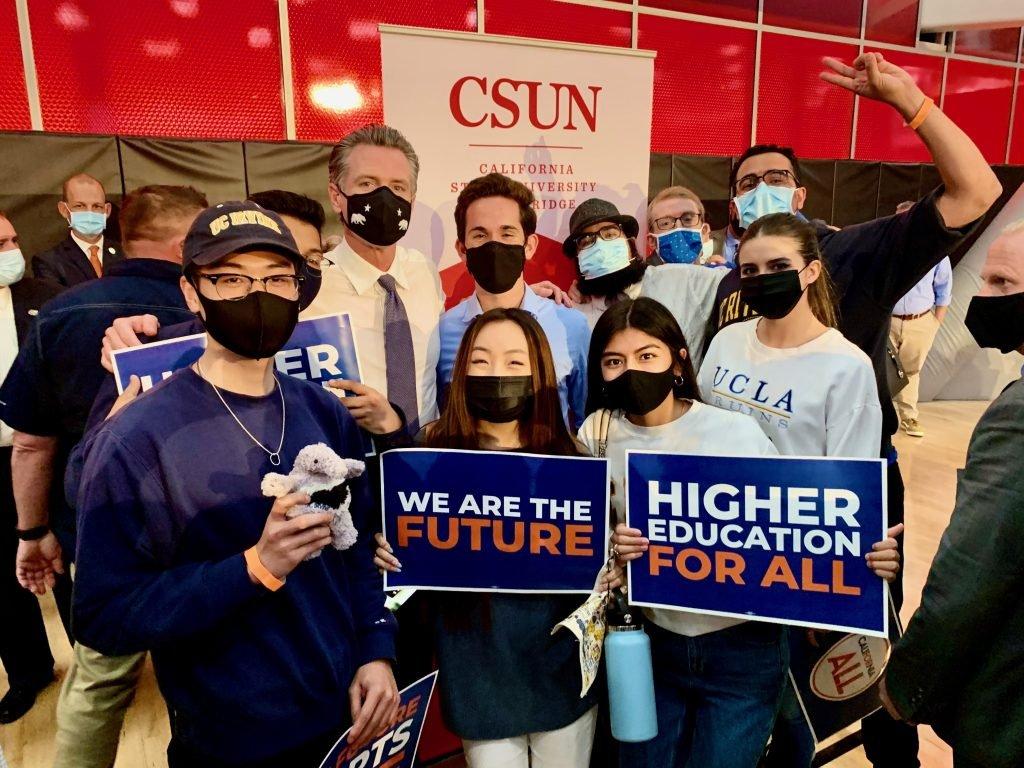COURTESY // @cagovernor on Instagram
Governor Newsom stands among supporters where he signed new bills into law at CSU Northridge.
In early October, Governor Gavin Newsom finished signing 770 new bills into law, many of which will have an impact on public universities and colleges across California.
Newsom concluded signing the last bill on Saturday Oct. 9, a day before the Oct. 10 deadline which marked the end of the 2020-21 legislative session. In total, 836 bills were proposed by state lawmakers, and 770 (92%) of these bills were signed by Newsom.
“In partnership with the Legislature, the Administration has taken bold action and made historic investments to address the state’s most persistent challenges to best ensure that every Californian, regardless of their race or zip code, can thrive,” read a statement posted to the official website for the Newsom’s office on Oct. 9.
In total, around 40-50 of the 770 bills and proposals signed by Newsom were about higher education. These bills are all a part of Newsom’s larger $100 billion California Comeback Plan, one of California’s biggest economic recovery packages, which Newsom signed back in July of 2021.
An article on Newsom’s website highlighted the ways in which this comeback plan is going to improve higher education in public universities across the state: “Making higher education more accessible than ever before: The Governor’s Plan will make college more affordable and accessible than ever before by increasing in-state tuition slots for Californians that want to attend a CSU or UC school, expanding financial aid systems for middle-class students and driving down the cost of attending college, cutting student housing costs and reducing the cost of textbooks.”
The following is a brief overview of some of these bigger, new laws that are set to impact higher education across California, including Sonoma State.
Assembly bill 1377 addresses changes for student housing. The bill states that all public California universities will be required to conduct a needs-based assessment of their university’s housing starting with the 2022-23 fiscal year. The bill also requires that each university comes up with a proposal that highlights how they plan on creating more affordable housing and better meeting students’ housing needs.
The California Comeback Plan official document also includes proposals that are set to improve housing for students, such as a “$2 billion over a three-year period to expand the availability of affordable student housing for low-income CCC, CSU, and UC students, thereby relieving one of the largest financial pressures students face and supporting timely degree completion.”
Assembly bill 396 will work to expand the benefits and eligibility of CalFresh for college students.
According to the official bill proposal, “Existing federal law provides that students who are enrolled in college or other institutions of higher education at least half-time are not eligible for CalFresh benefits unless they meet one of several specified exemptions.”
This bill will change the limitations of this eligibility barrier by requiring campus-based programs that will “increase employability that qualifies for the CalFresh student eligibility exemptions”.
Assembly bill 469 will make it mandatory that all California 12th grade students’ complete applications for financial aid, either through Free Application for Federal Student Aid (FAFSA) or the California Dream Act, by September 2022.
According to The Education Trust, “these proposals will boost college-going for low-income students and students of color by building college-going culture.”
Assembly bills 928 and 111 will both improve the transfer process for students looking to move from a community college to four-year public university.
Assembly bill 928 will require that community colleges “establish a singular lower division general education pathway,” which will help students intending to transfer, meet all the necessary requirements.
Assembly bill 111 will make it mandatory that all 116 California Community colleges establish a common course numbering system for all general education courses by July 2024. According to the bill proposal, “The bill would require the common course numbering system to be student facing and ensure that comparable courses across all community colleges have the same course number.”
These bills are just a few out of the many Newsom signed in support of bettering higher education and community access to higher education across California that we will begin seeing in action over the next few years.



































